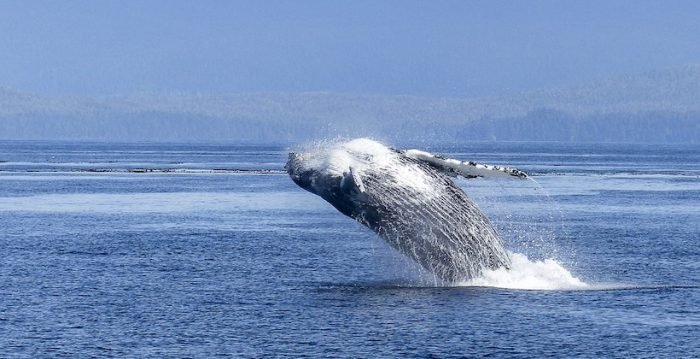
According to specialists, as there has been a decrease in global maritime traffic due to the pandemic, noise pollution has been reduced, which has positively impacted the stress levels of these animals and increased their chances of mating.
Richard García
Whales are now living in a less noisy and busy ocean, as global restrictions due to the pandemic have significantly reduced ship traffic. The good news for these mammals is that this can still go on for several months.
This scenario is an ideal situation for scientists to learn about aspects of cetacean behavior that are very difficult to verify in a normal situation.
“This is an experimental design that is impossible to plan. That all maritime traffic is closed, especially for leisure and recreation, is something unthinkable. It offers a unique opportunity to address these issues and obtain hard data at a global level,” said the American marine biologist Susannah Buchan, who is a researcher at the South Pacific Oceanographic Research Center (Copas) of the Universidad de Concepción.
She is part of one of several groups that currently have sonographs (instruments that record sounds underwater) installed and whose data will be able to accurately reconstruct marine acoustic contamination before, during and after the pandemic.
“What we expect is a drop in environmental noise,” said Buchan, whose team has instruments installed in the Gulf of Corcovado, off of Chiloé, and in the waters of northern Chile.
Just Like a Nightclub
There is already preliminary evidence confirming the reduction of noise under the sea. “A group of Canadian researchers recorded that in their country’s waters there is a 25% reduction in sound power just in the frequency range of ships,” said Sonia Español, a marine biologist who is also taking measurements in the Gulf of Corcovado.
The most concrete evidence that noise affects whales comes from a study conducted with right whales in the United States, which coincided with the attack on the Twin Towers. The researchers were monitoring cortisol (the stress hormone) levels outside the ports of Boston and New York. They saw that during the two days following the attack, when the ports were closed to all traffic, the whales’ cortisol levels dropped drastically.
It was the first proof that the ambient noise of ships influences the stress of cetaceans, said Buchan. “This study showed that there are very high levels of cortisol associated with maritime traffic and that is probably because of the noise of vessels and the threat posed by their sailing. That physiological stress is the same humans experience in an environment of extreme noise,” she said.
Español, who is the coordinator of the cetacean research area of Meri Foundation, also said that noise pollution can lead whales to leave an area to which they were accustomed. The risk is that it may be an important feeding or breeding area.
In addition, noise can affect cetaceans directly. “It has been seen in dolphins that if the noise is very strong or constant, they can suffer damage to their ears which can even lead to death if their eardrums burst.”
According to her, stress also makes cetaceans more vulnerable to disease.
In addition, the sound of the boats masks the vocalization of the whales, said Buchan, “Individuals can no longer hear themselves, it’s like when you have to shout to be heard in a nightclub. For populations in the process of recovery, such as the blue whale, this is complex because these animals have to communicate over long distances to find a mate and reproduce.”
In this way, the decrease of noisy ships in the sea will increase the possibility for whales to mate. “They are no longer hearing the loud background music, so at this moment they must be in a much more peaceful state than usual. Now we have to see how long this will last and how it looks in certain specific populations, because there are some in high danger of extinction. If these six to eight months of worldwide confinement overlap with their reproduction period, then we would probably talk about reproductive success, as whales would be safer from a biological point of view,” said the biologist of the Meri Foundation.
Additionally, the decrease in maritime traffic should reduce the statistics of ship strikes, at least this year. These collisions can be fatal for cetaceans. They can even be left so severely injured that they eventually die or lose their reproductive capacity. “Since there is no statistical clarity regarding collisions, it is difficult to have a before and after, but obviously the risk will be lower,” said Español.
Source: El Mercurio

